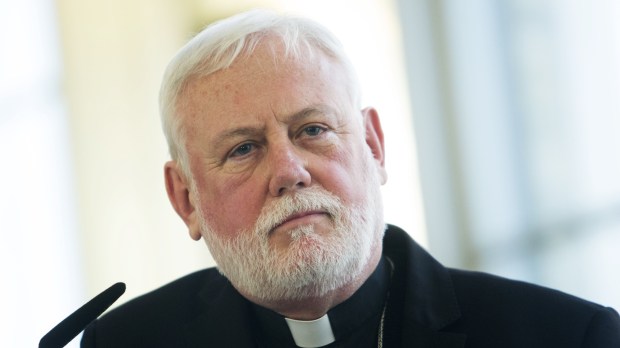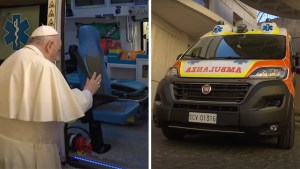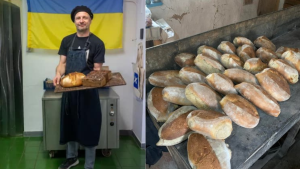Archbishop Paul Richard Gallagher, Secretary for Relations with States at the Vatican’s Secretariat of State, gave a joint press conference with Ukrainian Foreign Minister Dmytro Kuleba on May 20, 2022, in Kiev, on the third day of his visit to Ukraine. The head of papal diplomacy had visited Bucha a few hours earlier, where he paid his respects in front of a mass grave in which lie a hundred bodies.
The archbishop deplored “the many deaths, the violence of all kinds, the devastation of cities and infrastructure, the separation of so many families, and the millions of displaced persons and refugees.”
While acknowledging a “limitation in human attempts to find immediate ways to end this senseless conflict,” he said that “faith in God and in humanity” must lead us to persevere in the pursuit of peace.
The British archbishop said that his various meetings with Ukrainian civil and religious leaders and his visits to “three of the most martyred cities” have allowed him to “touch the wounds of the Ukrainian people and hear their passionate call for peace.” He reiterated the Holy See’s support for “a true negotiation process, the only just path towards a fair and definitive resolution” of this war.
Archbishop Gallagher thanked the Churches and their affiliated organizations, including the Ukrainian branches of Caritas, for their efforts to “meet the spiritual and material needs of the population” in the short and long term. He expressed his hope that they will find “the support they so desperately need” and that “the combined efforts of the whole world will soon bring an end to the destruction and death.”
30 years of diplomatic ties
The long-expected visit to Ukraine, which was postponed during the pandemic, was to have focused on “the positive elements of bilateral relations between the Holy See and Ukraine,” as 2022 marks the 30th anniversary of the establishment of diplomatic ties between the two states.
Archbishop Gallagher emphasized the Holy See’s “great satisfaction” with the relationship, highlighting the periodic exchange of high-level visits, especially in more recent years.
The Archbishop also noted the exchange of letters and phone calls between Pope Francis and Ukrainian president Volodymyr Zelensky, which, he said, “have taken on more significance in the sad context of the war in the Donbas over the last several years and the current large-scale conflict in Ukraine.”
Prayer for victims of Bucha massacre
During his visit to Bucha, Archbishop Gallagher visited a mass grave near the Orthodox Church of St. Andrew, where about 100 bodies were exhumed. Among these anonymous bodies are children. “We are witnesses to the suffering and martyrdom of this country,” he told Vatican News, acknowledging that the moment of prayer was “heartbreaking.”
On the first leg of his trip to Ukraine, to Lviv in the west of the country, where he began his journey on May 18, Archbishop Gallagher responded to criticism of papal diplomacy by assuring that the Pope is constantly concerned to “defend the Ukrainian people, to emphasize that they have their freedom, that the integrity of this country has been violated.”
“In our contacts with others, we have always affirmed that the Holy See remains fully committed to the territorial integrity of Ukraine,” Archbishop Gallagher assured.
On May 18 and 19, in Lviv, the head of papal diplomacy visited several places where displaced persons are being hosted. In addition to local political leaders and the Latin Archbishop of Lviv, Archbishop Mieczysław Mokrzycki, on May 19, Archbishop Gallagher also met with the Major Archbishop of Kiev, Sviastoslav Schevchuk, head of the Greek Catholic Church.
The visit, which was scheduled last month but postponed because of Archbishop Gallagher’s coronavirus infection, follows on the heels of trips to Ukraine by Apostolic Chaplain Konrad Krajewski and the Prefect of the Dicastery for the Service of Integral Human Development, Cardinal Michael Czerny.
Concern for Ukrainians transferred to Russia
On May 20, the diplomatic front was also played out in Rome, with the visit to the Vatican of the Ukrainian Parliament’s human rights ombudsman, Lyudmyla Denysova. She met with Cardinal Pietro Parolin, Secretary of State of the Holy See, and presented the situation of Ukrainians deported to the Russian territories.
“With His Eminence, I discussed the forced deportation to Russia of 1.3 million Ukrainians, including 230,000 children, planned in advance,” she explained in a Telegram message, relayed by the Polish agency KAI.
In it, she said she asked Cardinal Parolin “to use his authority and force Russia to provide Ukraine, the UN High Commissioner for Refugees, and the International Committee of the Red Cross with lists of deported Ukrainian citizens, and to facilitate their resettlement in third countries.”
The cardinal said that “the Holy See is appalled by the crimes of the Russians, that what they are doing is genocide,” the Ukrainian official reported. She added that she was assured by Cardinal Parolin that the Holy See would do everything in its power to help Ukraine and support the country’s peace efforts.
The Holy See did not release information about the meeting, as the Secretariat of State usually only releases information about meetings with heads of state or government.



